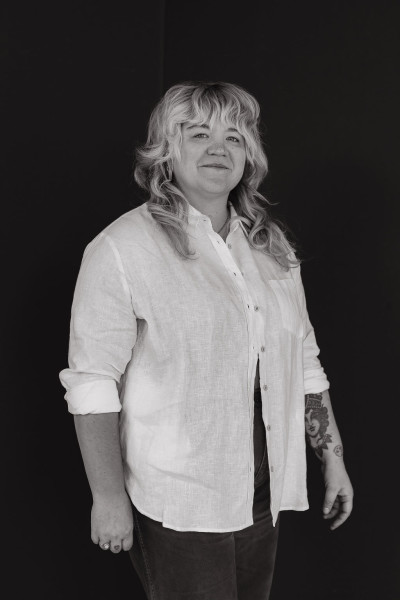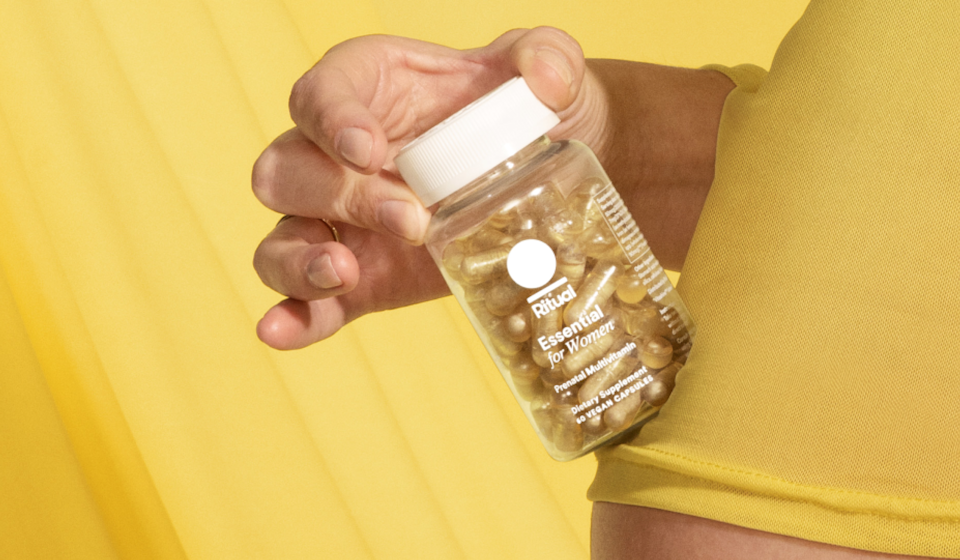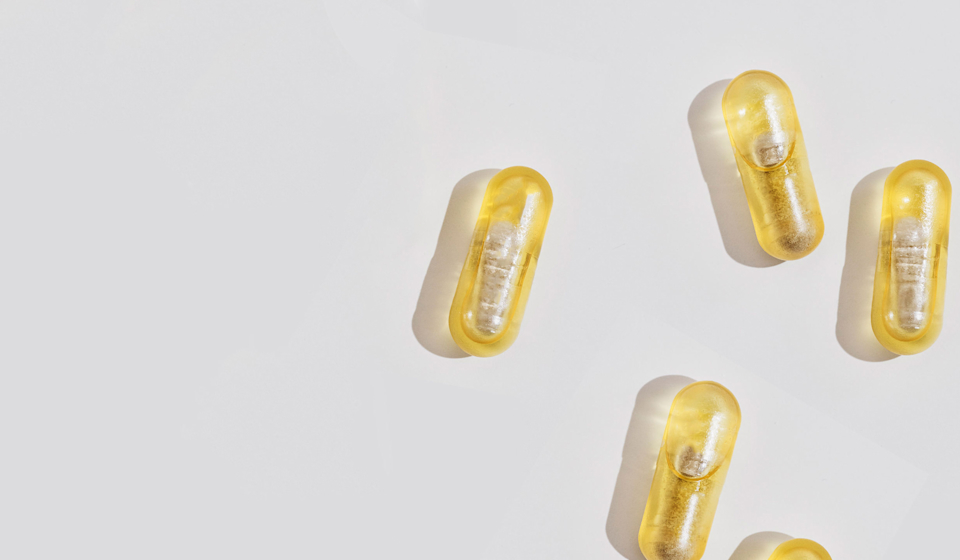14 Nutrients You Won’t Find In Our Essential Prenatal
Here are the 14 nutrients you won’t find in Essential Prenatal (and for good reason):
1. Vitamin A: The majority of pregnant people in the US get around 90% of the RDA of vitamin A from their diet. Vitamin A comes in two forms: retinoids, which you can find in cheese, eggs, oily fish, and liver products, and sources of beta-carotene that the body can convert to retinol. (5) These include spinach, sweet potato, cantaloupe, and carrots. Yum.
2, 3. 4, 5. Vitamins B1, B2, B3 and B6: Also known as thiamin, riboflavin, and niacin, (AKA the B vitamins). Of course you want these in your body. The good news is, you can get enough of most of them from your diet.
6. Vitamin C: The immune-supporting superhero we all know and love — but did you know that US adults typically get adequate amounts of vitamin C from their diet? Citrus fruits, broccoli, spinach, and bell peppers are all great sources and can be eaten in abundance.
7. Vitamin K1: Bone-building, blood-clot-supporting vitamin K1 is abundant in leafy green vegetables like collard, kale, cabbage, and spinach, as well as fortified drinks, and in smaller amounts, meat, cheese, and eggs. If you’re eating a varied, well-balanced diet, and do not have a condition that affects your vitamin K1 levels, then your diet alone should meet the recommended daily allowance.
8. Calcium: The most abundant nutrient in the body, calcium makes up the structure of bones and teeth and keeps tissue rigid, strong and flexible. Approximately 72% of calcium intake comes from dairy products and fortified foods. Non-dairy sources of calcium include veggies like kale, broccoli, and bok choy. By eating a balanced diet, it’s easy to meet the RDA of calcium and that’s why you don’t see it in our Essential Prenatal. Instead, we focus on calcium helper-nutrients like vitamin D3, vitamin K2, magnesium and boron—without their presence, supplementing with more calcium won’t necessarily help.*
9. Phosphorus: Because this mineral naturally occurs in many foods, it’s easy to meet the RDA through diet alone. Look to dairy, salmon, legumes, nuts, seeds, and asparagus to up your intake. Over 90% of pregnant women get enough phosphorus from their diet.
10. Copper: Hello, nuts, beans, and seeds. Copper aids iron absorption and partners with it to form new red blood cells — and most adults get enough of it from their diets.
11. Selenium: Most adults only require a small amount of selenium to help support their metabolism and thyroid. Most of this is easily attainable through sources like nuts and fish.
12. Potassium: Potatoes, lentils, dried apricots, and acorn squash are all excellent sources of potassium. According to the most recent National Health and Nutrition Examination Survey (NHANES) data, most pregnant women get around 80% of the RDA for potassium through their diet. With our food-first approach, we trust that you can get closer to 100% RDA through diet alone (and let’s be honest, an apricot is much more delicious than a supplement – even if ours do taste good).
13. Sodium: Good old salt. Our bodies need a small amount of sodium to function and the good news is that because it makes everything taste better, we’re very good at getting the RDA (and sometimes more) from our diet.
14. Zinc: This trace mineral supports enzyme function, the creation of DNA, and cell growth. All things you want to support your body during pregnancy — and you can do this through your diet alone. You can find zinc in meats, poultry, and seafood, and if you’re vegetarian or vegan, legumes and whole grains work too.*
So there you have it: we're incredibly rigorous about what we put into our Essential Prenatal. Period. Our capsules might taste good, but our food-first approach means we’d rather you get the nutrients you need from a nutrient-dense diet before tagging us in. That lets us focus on getting high quality, vegan-friendly key nutrients into your body when you need them. And because our science-backed 12 key ingredients fit perfectly into two agreeable (read: not horse-sized!) capsules, we hope to make your multivitamin ritual easier to sustain way beyond those first nine months.*
And now, it's easier to get than ever. Ritual Essential Prenatal is available at select Costco warehouses across the West Coast—a 60-day supply (2-pack) for just $48.99, our lowest cost per day anywhere we're sold. Find Ritual Essential Prenatal at your local Costco today.
Frequently Asked Questions (FAQ):
Do prenatal multivitamins contain all the nutrients you need during pregnancy?
Not always—and they’re not meant to. A well-formulated prenatal is designed to supplement a healthy diet, not replace it. Some nutrients are included because they’re harder to get consistently from food (like DHA, choline, or certain forms of folate). Others may be left out if most people already get enough from everyday meals. The goal isn’t to pack in everything—it’s to prioritize what matters most.*
Is it better to choose a prenatal with more ingredients?
Not necessarily. More nutrients don’t automatically mean better formulation. What matters is whether the included nutrients are evidence-backed, provided in bioavailable forms, and dosed appropriately. Overloading a supplement can increase pill size, cause digestive discomfort, or result in unnecessary intake of nutrients you’re already getting enough of from food.
How do I know if my prenatal is high-quality?
Look for transparency. Are ingredients listed clearly, without proprietary blends? Are nutrient forms specified (for example, 5-MTHF instead of generic folic acid)? Is there third-party testing for purity and heavy metals? A quality prenatal should tell you not just what is inside, but why it’s there.
Can I rely on diet alone instead of taking a prenatal vitamin?
In theory, a well-planned diet can cover many nutrient needs—but pregnancy increases requirements for certain nutrients that are difficult to consistently obtain in optimal amounts from food alone. That’s why most healthcare providers recommend a prenatal multivitamin to help fill potential gaps while diet does the foundational work.











